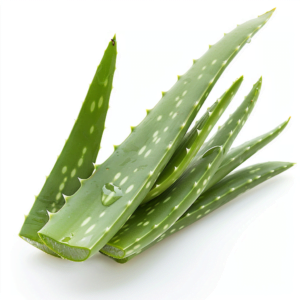No products in the cart.
Return To ShopThe Ancient Healer in Modern Times
Aloe vera, often hailed as the “plant of immortality” by the ancient Egyptians, continues to be a staple in health and beauty regimes around the world. This succulent plant, characterized by its thick, fleshy leaves filled with a soothing gel, is not only a delightful addition to home gardens but also a powerhouse of medicinal and skincare benefits.
A Closer Look at Aloe Vera’s Benefits
Skin Care Savior: Aloe vera gel is renowned for its ability to soothe sunburns, heal wounds, and moisturize the skin. Its application on the face can help in reducing acne and clearing blemishes, thanks to its anti-inflammatory and antibacterial properties.
Digestive Aid: Beyond its topical use, aloe vera is also consumed in the form of juice. It is believed to aid digestion, help in detoxification, and promote a healthy immune system. Some studies suggest that it can improve gastrointestinal health, making it a beneficial supplement for those with irritable bowel syndrome (IBS).
Nutrient-Rich: Packed with vitamins, minerals, and antioxidants, aloe vera supports overall health. It contains vitamin B12, folic acid, and choline, which are essential for metabolic processes, and minerals like calcium, chromium, and magnesium that contribute to bone health and metabolic functions.
Growing and Caring for Aloe Vera
Ideal Conditions: Aloe vera plants are low maintenance and thrive in warm, dry climates. They prefer well-drained sandy soil and do not require frequent watering, making them perfect for beginner gardeners.
Propagation: One of the most rewarding aspects of growing aloe vera is its ease of propagation. The plants often produce offsets, also known as “pups,” which can be separated from the mother plant and potted independently.
DIY Aloe Vera Remedies
Soothing Skin Gel: Extracting aloe gel is simple. Cut a leaf from the plant, slice it open, and scoop out the clear gel. Apply it directly to the skin for a cooling effect.
Homemade Aloe Juice: For a healthy drink, blend aloe gel with water and a squeeze of lemon for taste. This homemade juice can help with hydration and provide digestive benefits.
A Word of Caution
While aloe vera is generally safe for most people, it is crucial to conduct a patch test before topical application to rule out any allergies. Also, aloe vera juice should be consumed moderately, as excessive intake can lead to adverse effects like electrolyte imbalances.
The Bottom Line
Aloe vera’s multifaceted benefits and ease of use continue to make it a popular choice for those looking to enhance their health and skincare routines naturally. Whether you’re using it to calm a sunburn, improve your digestion, or simply as a decorative plant, aloe vera truly stands out as nature’s miracle.
As the world leans more towards natural and sustainable living, embracing plants like aloe vera that offer extensive benefits with minimal care requirements can be a step in the right direction for personal health and environmental sustainability.

The Ancient Healer in Modern Times
Aloe vera, often hailed as the “plant of immortality” by the ancient Egyptians, continues to be a staple in health and beauty regimes around the world. This succulent plant, characterized by its thick, fleshy leaves filled with a soothing gel, is not only a delightful addition to home gardens but also a powerhouse of medicinal and skincare benefits.
A Closer Look at Aloe Vera’s Benefits
Skin Care Savior: Aloe vera gel is renowned for its ability to soothe sunburns, heal wounds, and moisturize the skin. Its application on the face can help in reducing acne and clearing blemishes, thanks to its anti-inflammatory and antibacterial properties.
Digestive Aid: Beyond its topical use, aloe vera is also consumed in the form of juice. It is believed to aid digestion, help in detoxification, and promote a healthy immune system. Some studies suggest that it can improve gastrointestinal health, making it a beneficial supplement for those with irritable bowel syndrome (IBS).
Nutrient-Rich: Packed with vitamins, minerals, and antioxidants, aloe vera supports overall health. It contains vitamin B12, folic acid, and choline, which are essential for metabolic processes, and minerals like calcium, chromium, and magnesium that contribute to bone health and metabolic functions.
Growing and Caring for Aloe Vera
Ideal Conditions: Aloe vera plants are low maintenance and thrive in warm, dry climates. They prefer well-drained sandy soil and do not require frequent watering, making them perfect for beginner gardeners.
Propagation: One of the most rewarding aspects of growing aloe vera is its ease of propagation. The plants often produce offsets, also known as “pups,” which can be separated from the mother plant and potted independently.
DIY Aloe Vera Remedies
Soothing Skin Gel: Extracting aloe gel is simple. Cut a leaf from the plant, slice it open, and scoop out the clear gel. Apply it directly to the skin for a cooling effect.
Homemade Aloe Juice: For a healthy drink, blend aloe gel with water and a squeeze of lemon for taste. This homemade juice can help with hydration and provide digestive benefits.
A Word of Caution
While aloe vera is generally safe for most people, it is crucial to conduct a patch test before topical application to rule out any allergies. Also, aloe vera juice should be consumed moderately, as excessive intake can lead to adverse effects like electrolyte imbalances.
The Bottom Line
Aloe vera’s multifaceted benefits and ease of use continue to make it a popular choice for those looking to enhance their health and skincare routines naturally. Whether you’re using it to calm a sunburn, improve your digestion, or simply as a decorative plant, aloe vera truly stands out as nature’s miracle.
As the world leans more towards natural and sustainable living, embracing plants like aloe vera that offer extensive benefits with minimal care requirements can be a step in the right direction for personal health and environmental sustainability.

Enter your email address to get 20% off your first order.
Copyright © 2021 XStore Theme. All rights reserved. Designed by 8Theme.
